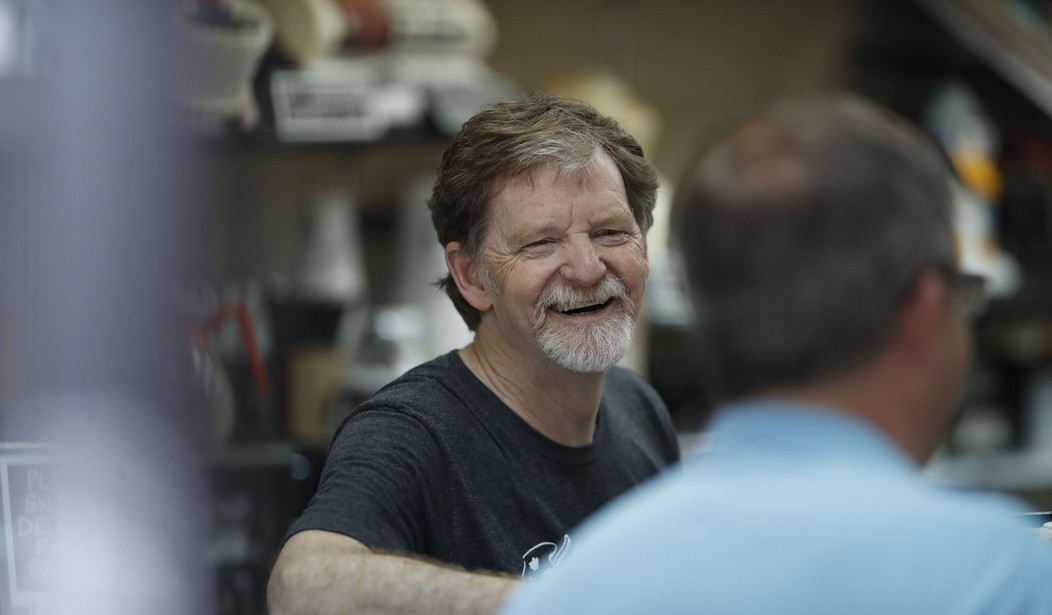When Jack Phillips, owner of Masterpiece Cakeshop in Colorado, first found himself on the wrong end of a lawsuit in 2012 for refusing to bake a custom cake for a same-sex wedding, it stirred a national debate over the fine line between individual religious freedom and anti-discrimination laws. After a long and protracted legal battle, the U.S. Supreme Court ruled in Phillip’s favor in 2018.
In its ruling, the court cited the brazen hostility of Colorado’s government against his Christian beliefs. Now, Phillips is facing yet another legal action, this time for declining to bake a cake celebrating transgenderism.
The current case is headed to the Colorado Supreme Court.
The Colorado Supreme Court agreed to hear the case against Christian cake baker Jack Phillips, which he says is the "light at the end of the tunnel" after more than 11 years in court.
Phillips, owner of Masterpiece Cakeshop in Colorado, declined to create a custom cake for a same-sex wedding in a move that sparked a 2012 lawsuit that ultimately landed him at the U.S. Supreme Court. In 2018, the nine justices ruled that the state of Colorado was hostile to Phillip’s religious beliefs and that the government can’t force anyone to create custom works of art that communicate a message.
But in 2018, Phillips faced a second lawsuit, this time from a transgender lawyer who requested a cake celebrating a gender transition. When Phillips declined, he was back in court on grounds that he discriminated against the lawyer. The Colorado Supreme Court just agreed to hear his case.
"I hope it is the light at the end of the tunnel. I’m pretty excited about it," Phillips told Fox News Digital in an interview. "The state court turned us down in our first case, but I think they realize now that I serve everybody."
At the heart of this conflict is another clash between First Amendment protections of religious practice and anti-discrimination statutes. The central question: To what extent can the state intervene in matters of religious belief while addressing discrimination?
The plaintiff in this lawsuit is Autumn Scardina, a transgender lawyer. In 2018, the same year that the U.S. Supreme Court ruled in Phillips’ favor, Scardina asked Phillips to bake a custom cake that was pink on the inside and blue on the outside to symbolize gender “transition.” Phillips refused, referring to his religious beliefs. The lawyer then asked him to bake a cake showing Satan smoking a marijuana joint. He refused this request as well. Predictably, Scardina sued.
The Alliance Defending Freedom (ADF), which is representing the baker, argued that this legal action violates his First Amendment rights. His lawyers posit that the government does not possess the authority to force individuals to express a message that contradicts their deeply held religious beliefs. In essence, the plaintiff is attempting to use the state to compel Phillips’ speech.
This case, like previous efforts to compel speech, could carry significant ramifications for religious freedom. If Phillips is found liable for discrimination, it could set a troubling precedent that would undermine the freedom of Americans to practice their religion. It could constitute a reinterpretation of the First Amendment in a way that makes it subservient to anti-discrimination laws.
Of course, that is precisely the objective here.
The authoritarian left has long enjoyed the idea of using the power of the state to compel the rest of the population to conform to its beliefs. Indeed, legal documents show that Scardina “promised Phillips that, were this suit dismissed, Scardina would call Phillips the next day to request another cake and start another lawsuit.”
This is not about cakes. It is not about discrimination. It is about authoritarians on the left trying to attack those they dislike using the government as a weapon. Folks like Scardina could easily find another baker who would be willing to agree to their requests. Instead, they want to use the state to bully people into acquiescing to their will.
This case is a critical one. It could potentially redefine the extent to which Americans are allowed to adhere to their religious beliefs. Hopefully, Phillips emerges victorious in this battle as well.













Join the conversation as a VIP Member